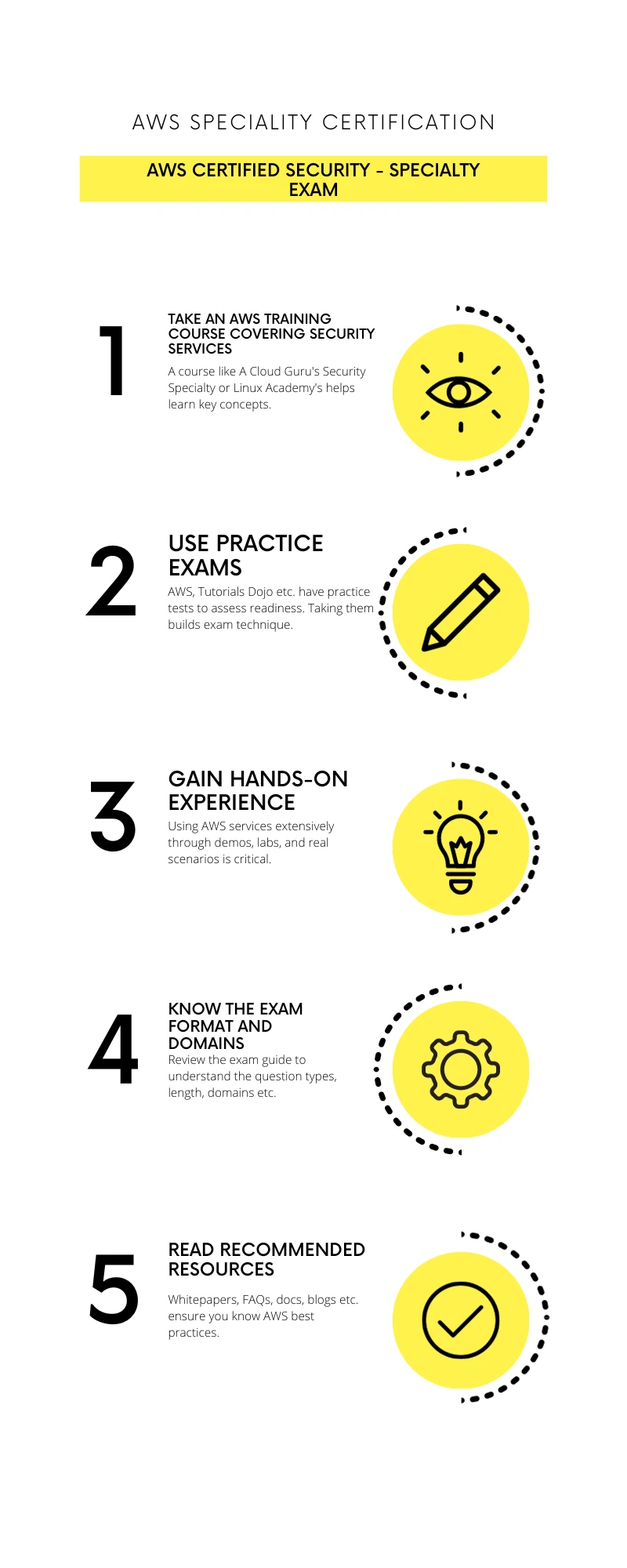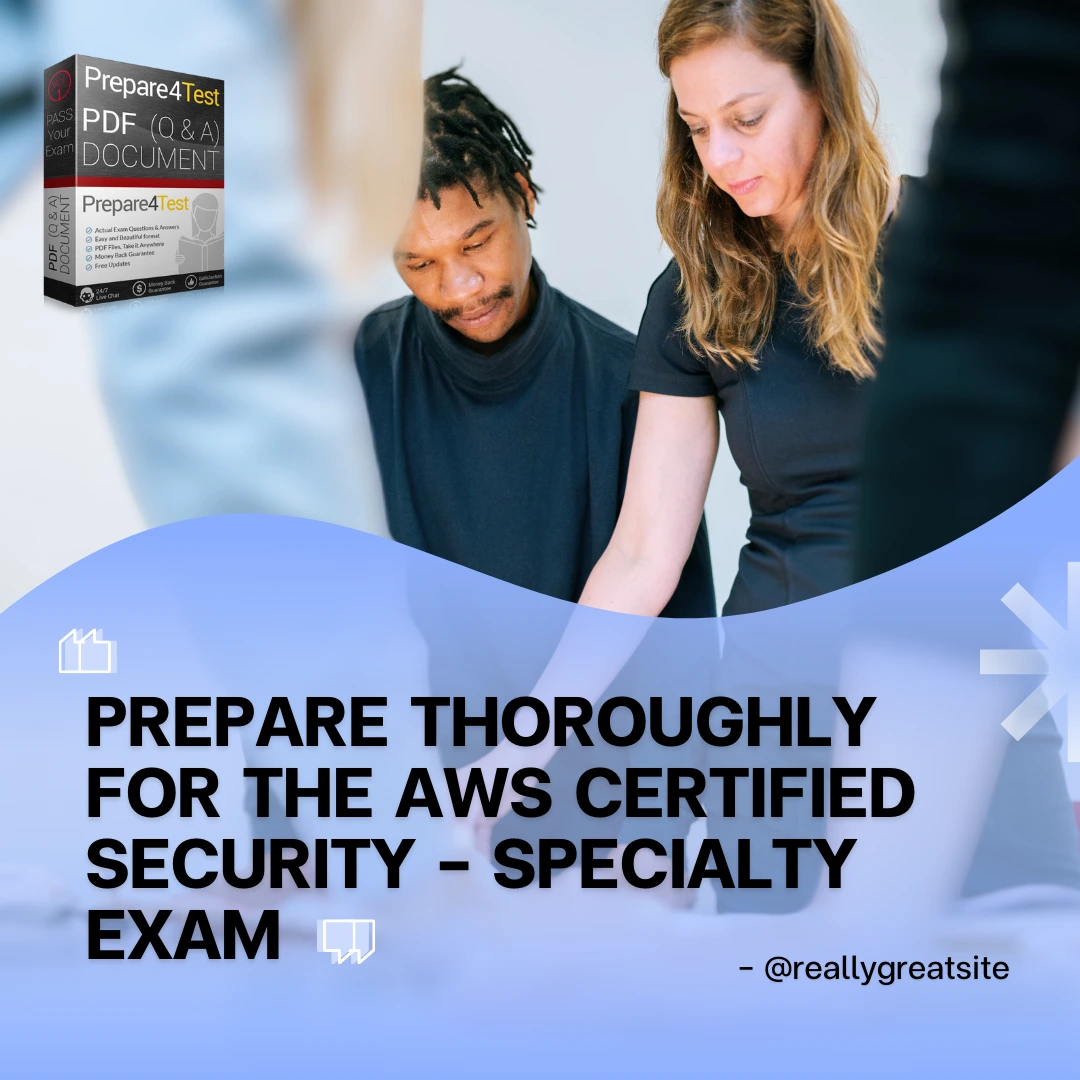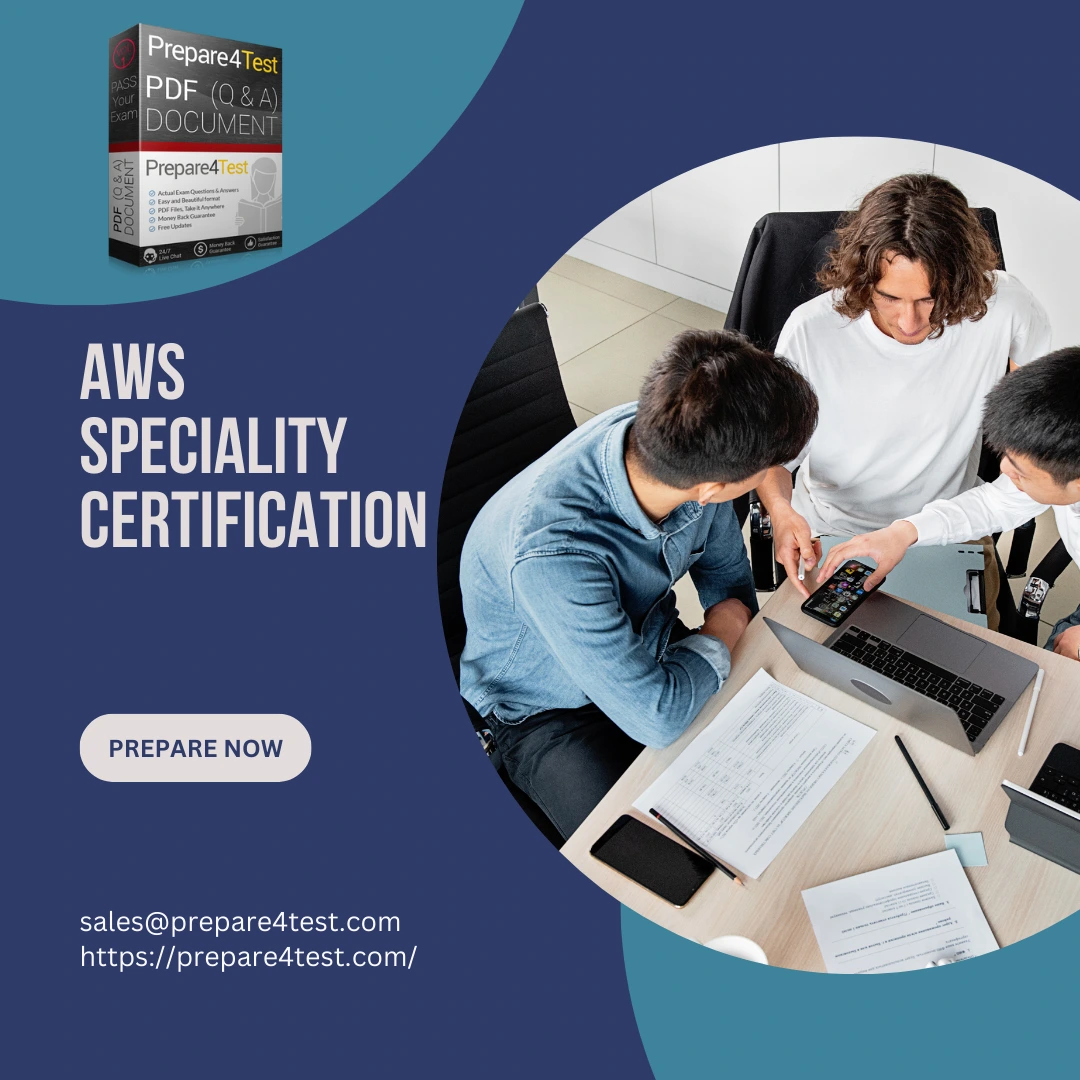
With data breaches on the rise, cloud security expertise is in high demand. Organizations are looking for professionals who can effectively secure cloud environments, like those with AWS Speciality Certification. This is where the AWS Certified Security – Specialty certification comes in.
The AWS Certified Security – Specialty validates your ability to secure AWS workloads and mitigate risks through the understanding of AWS security services. By getting certified, you showcase your expertise in:
– Implementing data protections like encryption and key management
– Leveraging AWS security services like IAM, GuardDuty, Inspector
– Performing incident response with tools like AWS Config and Security Hub
– Conducting vulnerability scans, penetration testing, compliance audits
– Architecting secure solutions on AWS
The certification exam covers 5 domains spanning security fundamentals, logging monitoring, infrastructure security, data security, and vulnerability management.
AWS recommends having 2+ years of hands-on experience securing AWS workloads before attempting the exam. Complementary certifications like Solutions Architect Associate are also helpful.
Overall, the AWS Certified Security – Specialty builds your credibility as a cloud security expert. It prepares you for roles like Security Analyst, Cybersecurity Engineer, and Cloud Security Architect. The certification validates in-demand skills, making you a trusted advisor for organizations adopting AWS.
Overview of AWS Speciality Certification and who it’s for
The AWS Certified Security – Specialty certification validates advanced technical skills and experience in securing AWS workloads. It is intended for professionals with at least 2 years of hands-on experience implementing security controls and compliance on AWS.
The certification covers a broad range of security topics like data encryption, infrastructure security, identity and access management, vulnerability management, and more. Candidates must demonstrate the ability to:
– Architect secure solutions on AWS using encryption, key management, IAM roles, security groups, VPC settings, etc.
– Remediate security incidents using AWS services like GuardDuty, Macie, Security Hub, etc.
– Monitor account activity and detect threats by analyzing logs and metrics.
– Perform security assessments to identify vulnerabilities in EC2 instances, RDS databases, Lambda functions, etc.
– Implement security features to meet compliance requirements like PCI DSS, HIPAA, etc.
The exam focuses on real-world scenarios and use cases. Passing it validates hands-on expertise in securing cloud environments.
AWS Speciality Certification recommends having prior AWS certifications like Solutions Architect Associate. However, the Security Specialty exam goes deeper into specific security features and services within AWS. It prepares candidates for roles like Security Engineer, Security Architect, and Chief Information Security Officer.
Benefits of getting certified

The AWS Certified Security – Specialty certification provides numerous advantages for cloud security professionals. Here are some of the key benefits:
– Validates your expertise in AWS security – Earning this certification demonstrates your in-depth knowledge of AWS security services and ability to architect secure solutions on AWS. It establishes your credibility as a cloud security expert.
– Career advancement – The certification helps you stand out from other candidates for lucrative cloud security roles like Security Engineer, Security Architect, and Chief Information Security Officer. It shows your commitment to specializing in AWS Speciality Certification.
– Higher salary – On average, IT professionals with AWS certifications earn 26% more than those without, according to a Global Knowledge survey. The specialized Security certification can boost earnings further.
– New job opportunities – LinkedIn reports over 50,000 job openings requesting AWS Speciality Certification. The Security Specialty certification makes you a competitive applicant for these roles.
– Learn best practices – Preparing for the certification helps you learn AWS security best practices directly from the experts at AWS. These skills are invaluable for securing cloud workloads.
– Trusted advisor status – Passing this advanced certification establishes you as a trusted advisor who can effectively secure AWS environments for organizations.
In summary, the AWS Certified Security – Specialty certification validates proficiency in AWS security, helps advance your career, and positions you as a cloud security expert. It’s a valuable credential for any IT pro looking to specialize in cloud security.
Prerequisites and Recommended Experience
Recommended AWS knowledge
To pass the AWS Certified Security – Specialty exam, you should have a strong grasp of core AWS services related to security. Key services to focus on include:
– Amazon VPC – Know how to design and implement secure VPC architectures, use security groups, NACLs, VPC endpoints, VPC flow logs, etc.
– AWS IAM – Understand IAM policies, roles, identity federation, and integrations with on-premises directories. Know how to implement least privilege access.
– AWS KMS – Know how to encrypt data at rest and in transit using KMS keys. Understand the difference between KMS key types.
– CloudTrail – Know how to monitor API calls and user activities through CloudTrail event logs.
– CloudWatch – Understand how to leverage CloudWatch for monitoring, alerting, and security analysis.
– GuardDuty – Know how it continuously monitors for threats, malicious activity, and unauthorized behavior.
– Security Hub – Understand how it centrally manages security alerts, findings, and recommendations across multiple AWS services.
Hands-on experience with these services is highly recommended. AWS also advises having prior AWS certifications like Solutions Architect Associate to build foundational knowledge of the AWS platform. Overall, focus your preparation on services related to logging, monitoring, infrastructure security, identity management, and data protection.
Recommended hands-on experience
Here are some recommendations for gaining hands-on experience to prepare for the AWS Certified Security – Specialty exam:
– Set up a demo AWS account and get familiar with core security services like IAM, VPC, CloudTrail, Config, etc. Follow tutorials to configure these services and try out different features.
– Do labs focused on security topics like:
– Encrypting S3 buckets, EBS volumes, RDS databases with KMS keys
– Securing EC2 instances and VPCs with security groups, NACLs
– Enabling AWS Config rules to audit resources
– Setting up CloudWatch alarms and CloudTrail logging
– Using AWS WAF to filter web traffic
– Scanning workloads with Inspector, Macie, GuardDuty
– Build sample architectures for common use cases like securing a web application and analyzing the security posture. Refer to AWS whitepapers.
– Monitor your demo account with Security Hub and analyze the findings/recommendations.
– Run CloudFormation templates to deploy sample workloads like WordPress sites. Then, perform security checks.
– Sign up for a free-tier Security Hub trial in your production account to get real findings.
– Read AWS security blog posts and webinars to stay updated on new features and best practices.
– Attend re:Invent videos and other conferences focused on security.
– Get hands-on experience with security tools like penetration testing, vulnerability scanners, SIEM solutions, etc.
The key is to get comfortable with AWS security services by using them extensively for various scenarios. Production experience is highly recommended. Leverage available labs and demos before attempting the certification.
Complementary certifications like Solutions Architect Associate
The AWS Certified Solutions Architect – Associate (SAA-C03) certification provides a solid baseline of knowledge for key AWS services, architectures, and best practices. This foundational understanding is very beneficial before attempting the more specialized AWS Certified Security – Specialty exam.
The SAA covers core services like EC2, S3, VPC, IAM, database services, networking, storage, etc. Having hands-on experience with these services through the SAA certification enables better comprehension of how to secure them for the Security Specialty exam. For example, you need a good grasp of Amazon VPC concepts like security groups, NACLs, VPC endpoints, VPC flow logs, etc. to architect secure network infrastructure.
Additionally, the SAA validates understanding of general architecture principles and multi-tier architectures on AWS involving web servers, databases, caching layers, etc. This provides context for implementing security controls and compliance in complex environments.
Though the SAA is not a hard prerequisite, AWS recommends having associate-level certifications before attempting AWS Speciality Certification. The SAA’s broad coverage of core AWS services and architectures ensures you have the necessary baseline to build advanced security skills on top. Those looking to earn the AWS Certified Security – Specialty certification will be better prepared by first becoming an AWS Certified Solutions Architect – Associate.
Amazon SCS-C01 Exam Details
The AWS Certified Security – Specialty exam is designed to validate advanced skills for securing workloads on AWS Speciality Certification. Here are some key details:
– Format: The exam has 65 multiple-choice and multiple-response questions.
– Length: The exam duration is 170 minutes, allowing ample time to read and answer questions.
– Cost: The exam fee is $300 USD. Discounted exam vouchers may be available.
– Languages: The exam is available in English, French, Italian, Japanese, Korean, Portuguese, Simplified Chinese, and Spanish.
– Locations: The exam can be taken at Pearson VUE test centers globally or as an online proctored exam.
– Score: The passing score is 750 out of 1,000 points. The exam has a compensatory scoring model rather than requiring a minimum score per section.
– Schedule: Exam appointments can be made online through your AWS account.
– Eligibility: The exam requires having an Associate or Professional level AWS certification.
– Prerequisites: AWS recommends having 5 years of security experience and 2+ years with AWS workloads.
– Recertification: Renew your certification every 3 years by passing the exam again or earning credits.
Knowing these key details will help you register for the exam, understand the scoring model, and ensure you meet the prerequisites to take the AWS Certified Security – Specialty certification exam.
Exam Domains and Knowledge Areas
1 Domain: Incident Response
The Incident Response domain tests your ability to detect, analyze, and respond to security incidents on AWS. You should be able to design and implement an incident response plan outlining roles, responsibilities, and processes for handling incidents.
Key knowledge areas include threat detection services like GuardDuty, Macie, Security Hub that continuously monitor for anomalies, malicious activity, unauthorized behavior, etc. You need to know how to leverage these tools to identify potential incidents and compromised resources. For instance, reviewing findings in Security Hub and correlating threats across services using Amazon Detective.
Once a potential incident is detected, skills like isolating compromised EC2 instances, capturing forensic data, and performing root cause analysis are important. You should also know remediation mechanisms like stopping an unusual user behavior or rotating compromised credentials using AWS Lambda functions.
The exam validates using AWS services to automate incident response. You need to be able to integrate native AWS services like Security Hub and Config, as well as third-party solutions using Amazon EventBridge. This allows you to trigger automated actions like notifications, runbooks execution, etc. When an incident or security finding occurs.
Overall, this domain evaluates real-world abilities to establish an incident response framework leveraging AWS services, detect anomalies and threats, analyze the impact, and rapidly remediate issues. Hands-on experience with services involved in incident response is key to passing this domain.
2 Domain: Logging and Monitoring
The Logging and Monitoring domain evaluates your ability to design, implement, and troubleshoot logging, monitoring, and alerting solutions on AWS.
You need expertise in services like CloudTrail, CloudWatch, VPC Flow Logs, GuardDuty, and Security Hub to continuously collect and analyze security telemetry. For example, you should know how to leverage CloudTrail to track API calls and user activities. You also need to understand CloudWatch metrics, logs, and alarms to detect anomalies.
This domain validates skills in aggregating and correlating log data from multiple sources to identify issues. You should know how to analyze logs using Athena, CloudWatch Logs Insights, etc., to uncover security events. Normalizing and parsing logs for ingestion into SIEM tools is also assessed.
Troubleshooting, logging, and monitoring are key. You need to diagnose the causes of missing logs, like permissions errors. Remediating misconfigurations in CloudWatch alarms, EventBridge rules, etc. is also tested.
Overall, this domain evaluates real-world skills to build robust logging, monitoring, and alerting to secure AWS environments. Hands-on experience with services involved in collecting, storing, analyzing, and acting on security telemetry is critical to pass this domain.
3 Domain: Infrastructure Security
This domain assesses your ability to implement security best practices across your AWS architecture, from an individual resource up to the network layer.
You need expertise in securing AWS compute services like EC2, ECS, Lambda, etc. This covers topics like hardening instances, limiting network access via security groups, and encryption. For storage services like S3, EBS, EFS, you need to know access controls, encryption, data protection mechanisms etc.
Securing databases on AWS (RDS, DynamoDB, etc.) is also tested – encryption, network isolation, access management, logging etc.
Network security is a major focus. You need to demonstrate skills like designing VPCs, applying NACLs, route tables, VPC endpoints, VPC flow logs etc. Hybrid connectivity via VPN and AWS Direct Connect needs to be understood.
Edge network security using API Gateways, load balancers, CloudFront, WAF is also evaluated. You should know how to build layered defenses at the application edge.
Compliance is covered – implementing security controls to meet standards like PCI DSS, ISO 27001.
The key is knowing how to secure AWS infrastructure comprehensively – from the instance to the network perimeter. Hands-on experience with security features of core AWS services is critical to pass this domain.
4 Domain: Data Security
This domain focuses on managing access to AWS resources using identity and access management (IAM). You need expertise in IAM policies, roles, identity federation, and integrations with on-premises directories.
A major area is designing and implementing least privilege access by writing IAM policies to grant only necessary permissions. You should know multi-factor authentication (MFA) methods to provide additional identity verification.
Federated access with external identity providers via SAML and social identity providers is tested. This includes integrating AWS IAM with Microsoft Active Directory for single sign-on.
Troubleshooting IAM permissions is key. You need to diagnose the causes of failed access like invalid policies, misconfigured trust policies, or expired credentials. Remediating issues like overly permissive policies or inactive users is assessed.
Overall, this domain evaluates real-world skills for managing identities and controlling access to AWS resources. You must demonstrate competency in architecting scalable, secure authentication and authorization systems using IAM features. Hands-on experience with IAM, MFA, federated access, and troubleshooting permissions is critical to pass.
5 Domain: Vulnerability Analysis and Management
This domain evaluates your ability to identify vulnerabilities and implement mitigations in AWS environments. You need to know vulnerability analysis services like Amazon Inspector that can automatically scan EC2 instances, containers, and serverless functions for security issues. Understanding how to analyze findings, prioritize risks, and remediate vulnerabilities is key.
Skills in penetration testing and ethical hacking are assessed. You should know how to leverage AWS penetration testing tools and bug bounty programs to identify weaknesses. Understanding shared responsibility for patching and hardening the OS, applications, etc., based on scan results is important.
You also need expertise in AWS compliance services like AWS Artifact, that provide on-demand access to AWS security and compliance reports. Knowing how to implement controls to meet standards like HIPAA, PCI DSS, FedRAMP, etc. is evaluated.
Overall, this domain tests real-world skills to perform vulnerability scans, penetration tests, compliance audits, and effectively remediate findings. Hands-on experience with Inspector, Macie, Artifact, penetration testing methods, and compliance frameworks is essential to pass.
Preparation and Training Options

Thorough preparation is key to passing the AWS Certified Security – Specialty exam. AWS recommends completing intermediate-level courses on AWS security services as well as hands-on labs to reinforce concepts.
The exam readiness training course offered by AWS provides an overview of each domain. Practice exams like the one from AWS help assess your knowledge. Courses offered on platforms like A Cloud Guru and Linux Academy provide robust exam prep covering use cases and demo labs.
Reading AWS whitepapers like the AWS Security Best Practices whitepaper ensures you understand key concepts and architectures. Attending security-focused sessions at AWS re:Invent also helps.
Hands-on experience is critical. Using the AWS free tier to work with services like IAM, CloudTrail, VPC, etc. will build proficiency. Trying out services in Security Hub helps understand their integration.
Focus your preparation on services related to the 5 exam domains – incident response, logging/monitoring, infrastructure security, identity & access management, and vulnerability management.
Leverage all available resources – AWS docs, whitepapers, training courses, practice exams, labs, and real-world experience. Dedicate time to build hands-on skills with core security services before attempting the certification.
Recertification
To maintain your AWS Speciality Certification, you must recertify every 3 years. This ensures you stay current on the latest AWS security services, features, and best practices.
The two options for recertifying are:
– Retake and pass the AWS Certified Security – Specialty exam. This will extend your certification validity for another 3 years from the date you pass the recertification exam.
– Earn continuing education (CE) credits and submit an application to renew your certification. You need to earn at least 120 CE credits within 3 years of initially passing the exam. Sources for CE credits include AWS online courses, AWS events like re:Invent, and industry events.
Recertification demonstrates your continued expertise in the latest AWS security technologies and your commitment to ongoing learning. It also renews your certification so you can continue using the credential.
You can check your certification expiration date and recertification options in your AWS account. Ensure you schedule your recertification exam or start earning CE credits well in advance of the expiration deadline.
Set a goal to recertify before your certification lapses. This maintains the validity and value of the credential. Leverage the many AWS training resources to prepare for recertification. Staying current on new services and best practices will make maintaining your certification easier.
Career Opportunities and Benefits
Earning the AWS Certified Security – Specialty certification opens up exciting career opportunities and provides numerous professional benefits.
The certification validates your expertise in securing AWS workloads, allowing you to pursue lucrative roles like Cloud Security Architect, Cybersecurity Engineer, and Chief Information Security Officer. Organizations urgently need security professionals with cloud skills, making certified candidates highly sought after.
According to Burning Glass, AWS security certifications are associated with a $24,000 salary premium on average. The specialized Security certification can boost earnings potential even further.
The certification also enhances your credibility and trustworthiness regarding cloud security. Passing this advanced exam establishes you as an AWS security expert that organizations can rely on to architect and implement robust security solutions on AWS.
It demonstrates you can effectively apply AWS security services to meet industry best practices and compliance standards. This helps position you as a strategic security advisor for companies adopting AWS.
Overall, the AWS Speciality Certification validates in-demand skills, helps you stand out from other candidates, increases earning potential, builds credibility, and expands career possibilities. It cements your status as a cloud security expert.

